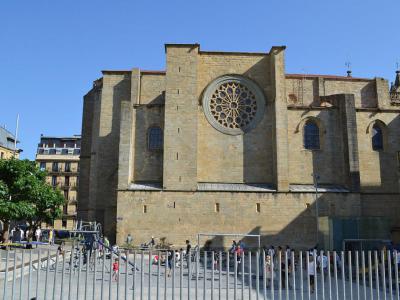Iglesia de San Vicente Martir (Church of Saint Vicente Martir), San Sebastian
The Church of Saint Vicente Mártir doesn’t simply sit in San Sebastián’s Old Town-it anchors it, carrying more than five centuries of memory in its stone. Dedicated to Saint Vincent of Saragossa, the 4th-century martyr, it began rising in 1507 on the footprint of an earlier parish temple. The design is a lesson in contrasts: three naves with the central one soaring higher, Gothic in spirit but softened by Basque sensibilities. Its 19th-century façade ties the threads together with a rose window, biblical carvings, and a striking modern Pietà by Jorge Oteiza, where the Virgin spreads her arms in grief and resilience.
Despite its ecclesiastical purpose, the building doesn’t hide its past as part of a fortified town. A sentry box still clings to its exterior, and loopholes on the sea-facing side remind us that this church once served double duty-house of worship and defensive outpost. Inside, slender pillars crowned with vegetal capitals support pointed arches and ribbed vaults that lift the gaze upward, away from the noise of the Old Town just beyond its doors.
Art, however, is what gives the church its most enduring voice. The 16th-century Renaissance altarpiece, richly gilded and painted, narrates the life of Christ and the Virgin with theatrical detail. At the back, Filipe de Arizmendi’s 18th-century sculptures-the “Medallion of Souls” and “Ecce Homo”-add local craftsmanship to the mix, while side chapels sponsored by prominent families turn the space into a gallery of civic pride as much as faith.
For travelers, Saint Vicente Mártir offers a direct line into San Sebastián’s oldest layers, where Gothic stone, Renaissance artistry, and centuries of devotion are still present in every arch and carving.
Despite its ecclesiastical purpose, the building doesn’t hide its past as part of a fortified town. A sentry box still clings to its exterior, and loopholes on the sea-facing side remind us that this church once served double duty-house of worship and defensive outpost. Inside, slender pillars crowned with vegetal capitals support pointed arches and ribbed vaults that lift the gaze upward, away from the noise of the Old Town just beyond its doors.
Art, however, is what gives the church its most enduring voice. The 16th-century Renaissance altarpiece, richly gilded and painted, narrates the life of Christ and the Virgin with theatrical detail. At the back, Filipe de Arizmendi’s 18th-century sculptures-the “Medallion of Souls” and “Ecce Homo”-add local craftsmanship to the mix, while side chapels sponsored by prominent families turn the space into a gallery of civic pride as much as faith.
For travelers, Saint Vicente Mártir offers a direct line into San Sebastián’s oldest layers, where Gothic stone, Renaissance artistry, and centuries of devotion are still present in every arch and carving.
Want to visit this sight? Check out these Self-Guided Walking Tours in San Sebastian. Alternatively, you can download the mobile app "GPSmyCity: Walks in 1K+ Cities" from Apple App Store or Google Play Store. The app turns your mobile device to a personal tour guide and it works offline, so no data plan is needed when traveling abroad.
Iglesia de San Vicente Martir (Church of Saint Vicente Martir) on Map
Sight Name: Iglesia de San Vicente Martir (Church of Saint Vicente Martir)
Sight Location: San Sebastian, Spain (See walking tours in San Sebastian)
Sight Type: Religious
Guide(s) Containing This Sight:
Sight Location: San Sebastian, Spain (See walking tours in San Sebastian)
Sight Type: Religious
Guide(s) Containing This Sight:
Walking Tours in San Sebastian, Spain
Create Your Own Walk in San Sebastian
Creating your own self-guided walk in San Sebastian is easy and fun. Choose the city attractions that you want to see and a walk route map will be created just for you. You can even set your hotel as the start point of the walk.
San Sebastian Introduction Walking Tour
After watching bulls run around in Pamplona, Ernest Hemingway took a relaxing trip up north. He enjoyed the calmness of the shoreline so much that he vividly described it in his novel The Sun Also Rises. The city that appealed to Hemingway was San Sebastián-known in Basque as Donostia.
The city takes its name from Saint Sebastian, the early Christian martyr whose cult spread widely through... view more
Tour Duration: 2 Hour(s)
Travel Distance: 3.0 Km or 1.9 Miles
The city takes its name from Saint Sebastian, the early Christian martyr whose cult spread widely through... view more
Tour Duration: 2 Hour(s)
Travel Distance: 3.0 Km or 1.9 Miles
Mount Urgull Walking Tour
Mount Urgull is a promontory stretching out at the eastern end of La Concha Bay, surrounded by water on all sides, except the one linking it to the Old Town of San Sebastian. Historically, this mount, rising 123 meters above sea level, served as a strategic defense point for the city, attesting to which now are the remnants of old fortifications with cannons still in place.
From its elevated... view more
Tour Duration: 1 Hour(s)
Travel Distance: 2.7 Km or 1.7 Miles
From its elevated... view more
Tour Duration: 1 Hour(s)
Travel Distance: 2.7 Km or 1.7 Miles





